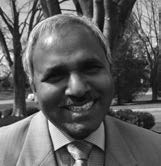Indian villagers faced constant trouble from an intruding tiger.
The wild animal crept by night into Gudem Madhavaram, a remote village with no electricity on a mountainside in India’s Andhra Pradesh state.
The villagers—dependent upon goats, cows, and bulls to produce milk and cultivate crops for their rich landowners—watched in despair as their animals were devoured one by one. They prayed to their gods for protection, but nothing happened.
One day, a tall white man with a crooked stick arrived on horseback. He spoke the local Telugu language, and the villagers stared at his crooked stick. When the stick coughed, animals went to sleep. Permanently.
The villagers learned that the man was an American named Dr. Theodore
R. Flaiz. He had opened a small hospital in Nuzvid, 30 miles (50 kilometers) away from the village, and a training school for workers in Narsapurm, 110 miles (180 kilometers) away. When he wanted to rest from his work, he hunted on their mountain. He donated the game to the villagers.
On Saturdays, he sat in the shade of a village tree, removed his coat, and sang songs. When the villagers asked what he was singing, he explained that he was worshiping the Creator God. “We want to see the Creator God,” the villagers said.
The white man opened a black Book and read aloud about the Creator God. As the tiger problem grew, the village elders won a promise from the white man to help. They tied a goat to a tree trunk in the village center. In the branches, they built a platform where the white man could sleep. That night, they tied a rope to his leg and retreated to their huts to keep watch.
In the night’s darkness, a large tiger approached. The watching villagers jerked the string, waking up the white man. He caused his crooked stick to cough. The tiger, however, was only wounded and fled. Later, the tiger returned, was shot, and fled again. After several attempts, the tiger was shot dead.
After that, the friendship between Dr. Flaiz and the villagers grew greatly, and a small Seventh-day Adventist congregation was established. One of the first converts—a young man who had helped tie the goat to the tree and kept watch at night—was Sundar Rao, my father. He was baptized in 1955. Today, Gudem Madhavaram is an Adventist village. It has produced 40 pastors and Bible workers and many educators and health professionals. On Saturdays, the whole village comes to a halt to worship the Creator God.

